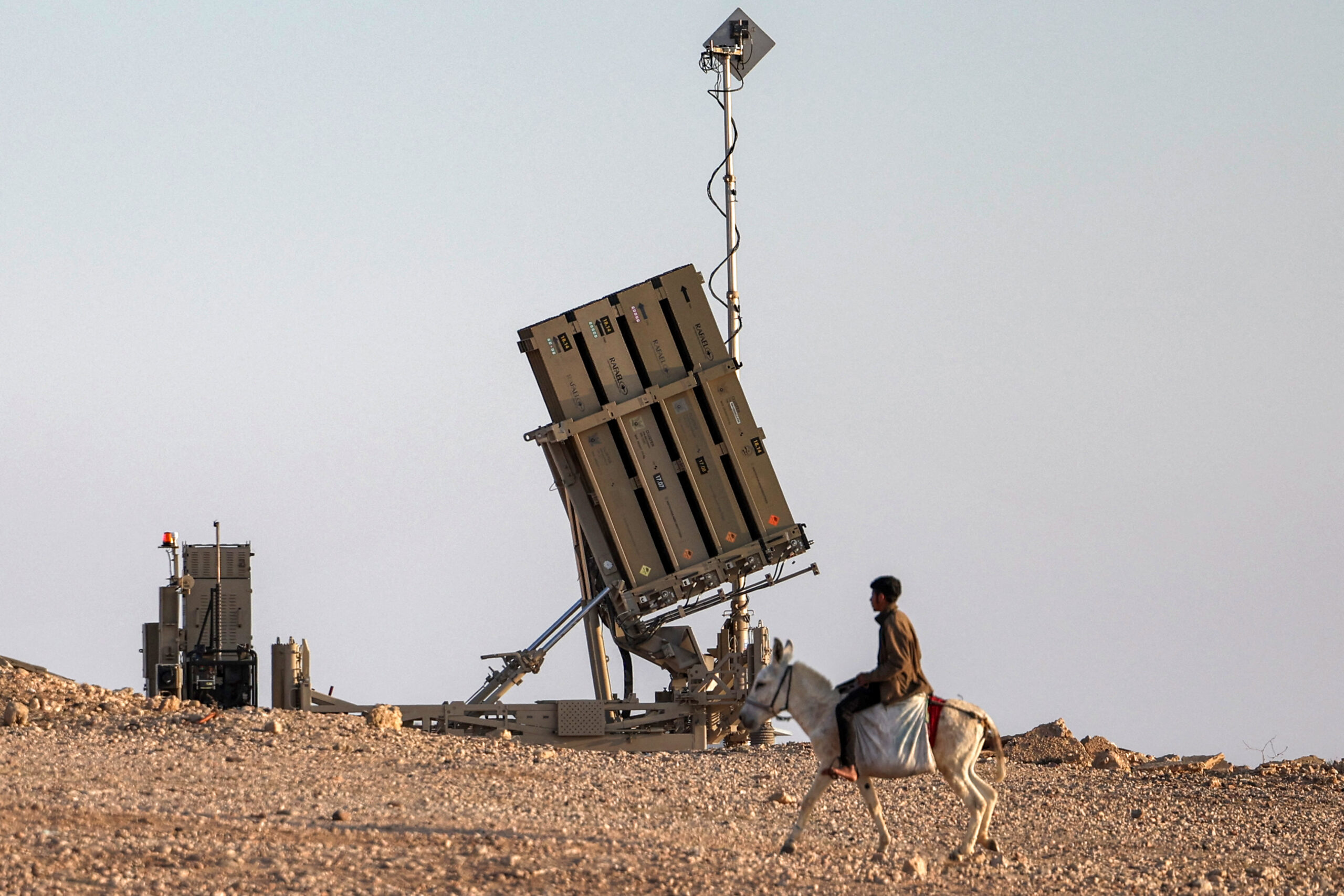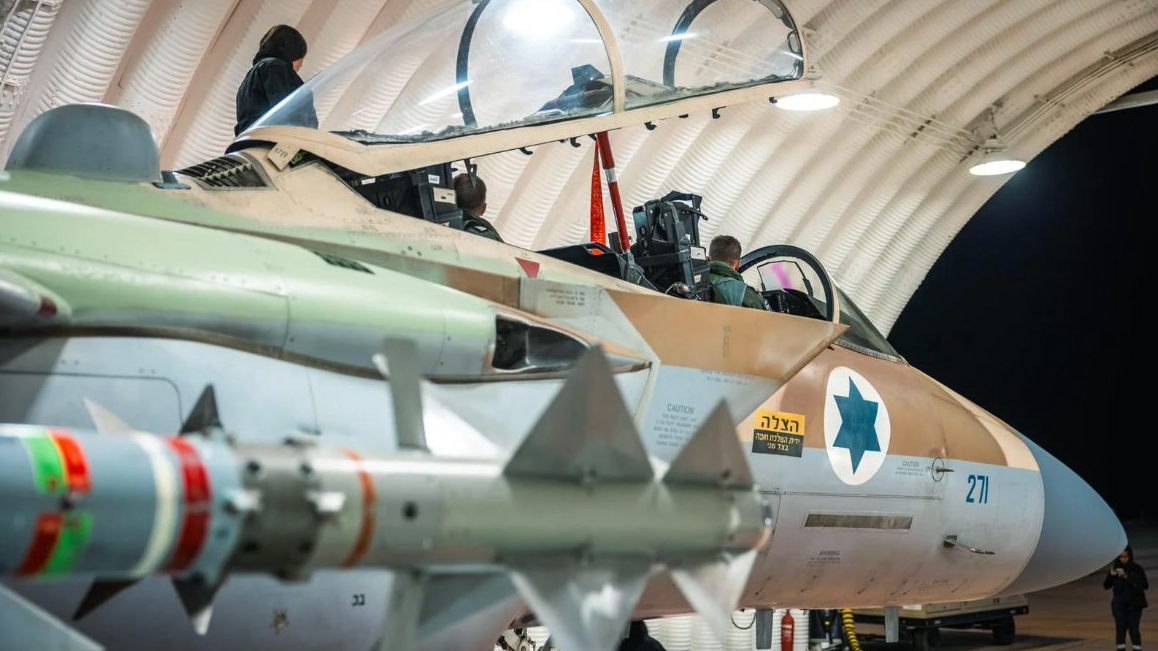With the world waiting for Israel’s response to the Iranian drone and missile attack launched against it over the weekend, more details are emerging about the multinational efforts to counter those strikes, which saw almost all threats successfully intercepted. It’s emerged now that several Gulf states, including Saudi Arabia and the United Arab Emirates, passed on vital intelligence about Iran’s attack plans, as well as real-time tracking data, which, in turn, helped thwart Tehran’s assault.
You can read our full analysis of the Iranian attacks here.
Citing Egyptian, Saudi, and U.S. officials, the Wall Street Journal today reported that intelligence provided by Gulf states — including radar tracking information — was vital to the air defenders’ success.
As well as Israel’s own air defenses, the U.S. military was also involved in combating the Iranian attack, as you can read about here, and British, French, and Jordanian assets also took part. On the Israeli side, it has now been announced that the weekend’s operation was named Iron Shield.
It was previously known that Jordan was actively involved in blunting the Iranian attack, its F-16s intercepting threats as they passed through its airspace.
What has since emerged is that Saudi Arabia and the United Arab Emirates — and possibly other Arab nations in the region — assisted too. While the Saudis have never had official diplomatic ties with Israel, those between Israel and the U.A.E. have been fractious despite the ‘normalizing’ of relations in recent years.

“Two days before the attack, Iranian officials briefed counterparts from Saudi Arabia and other Gulf countries on the outlines and timing of their plan for the large-scale strikes on Israel so that those countries could safeguard airspace, the officials said,” according to the WSJ report. “The information was passed along to the U.S., giving Washington and Israel crucial advance warning.”
As well as attack plans, the intelligence included real-time data on the Iranian threats headed toward Israel.
In this way, early warning radars in different countries in the Gulf provided drone and missile tracks to the U.S.-run Combined Air Operations Center (CAOC) at Al Udeid Air Base, Qatar, which in turn fed that information to air defense assets on the ground, in the air, and at sea.
The cooperation was reportedly the result of a “decades-old but elusive U.S. goal to forge closer military ties between Israel and its longtime Arab adversaries.”
Forging this loose alliance was a particular challenge given the wider tensions in the Middle East right now, as Israel continues its war in Gaza.
“The challenge was to bring all those countries around Israel” at a time when Israel is isolated in the region, a source described as a senior Israeli official told the WSJ. “It was a diplomatic issue.”
There had been earlier moves in this direction, however, most notably the efforts toward the establishment of an integrated air defense coalition in the region, as you can read about here. In particular, this initiative emerged from a need to coordinate against Iran’s expanding drone and missile capabilities, but it never had previously resulted in real-time sharing of tracking data on Iranian threats.
What’s clear is that the intelligence helped air defenses destroy what Israel claims were 99 percent of the incoming drones and missiles. A significant number of Iranian weapons failed before reaching a point where they could be engaged at all.
We also now have some more details on the scope of the Israeli attack, and the efforts to blunt it.
At one point, there were reportedly 100 Iranian ballistic missiles in the air simultaneously, on a course toward Israel. These missiles were part of a total of approximately 120 ballistic missiles, 30 cruise missiles, and 170 drones launched by Iran, according to the Israel Defense Forces (IDF). Footage today emerged that appears to show members of the IDF recovering the wreckage of one of those Iranian medium-range ballistic missiles.
According to U.S. Central Command (CENTCOM), its own forces, supported by U.S. European Command destroyers, successfully engaged, and destroyed more than 80 one-way attack drones and at least six ballistic missiles launched toward Israel from Iran and Yemen.
The total includes a ballistic missile on its launcher vehicle and seven drones destroyed on the ground in Houthi-controlled areas of Yemen prior to their launch.
Meanwhile, U.S. aircraft are now said to have destroyed more than 70 drones, while two U.S. Navy Arleigh Burke class destroyers in the eastern Mediterranean intercepted as many as six missiles. As we previously anticipated and were first to report, those warships used Standard Missile-3 (SM-3) anti-missile interceptors in the course of those operations, marking the first combat use of those advanced weapons. That fact has since been confirmed by the U.S. Navy, with officials telling USNI News that the two destroyers — USS Arleigh Burke (DDG-51) and USS Carney (DDG-64) — fired between four and seven SM-3 missiles.
Also responsible for downing an Iranian ballistic missile on its way to Israel was a U.S.-operated Patriot air defense system located near Erbil, Iraq, according to reports.
While there have been multiple reports that the Iranian attack resulted in only minor damage, an account from a senior U.S. defense official, first published by ABC News, suggests that five ballistic missiles did hit Nevatim Air Base. The official said that one Israeli Air Force C-130 transport aircraft was damaged, together with an unused runway, and empty storage facilities. Previously, the Israeli Air Force had released photos showing cratering at the airbase.
At this point, it’s unclear what kind of response to the Iranian assault can be expected from Israel.
However, officials have been discussing their next move, with the Israeli war cabinet today having met to work out their course of action, according to Channel 12 TV news reports.
The same report claims that various options were discussed, all being variations of a “painful” retaliatory strike but one that is tailored to not escalate into a wider regional war.
Speaking today, French President Emmanuel Macron said that his country will do everything it can to avoid further escalation in the Middle East.
“We will do everything to avoid a conflagration — that is to say an escalation,” Macron, said, according to a report from AFP. “We need to be by Israel’s side to ensure its protection to the maximum, but also to call for a limit to avoid an escalation. The focus should be on isolating Iran, convincing countries in the region that Iran is a danger, increasing sanctions, reinforcing pressure over nuclear activities,” he added.
Macron also provided more details of the French involvement in intercepting Iranian drones and missiles at the weekend. Referring to the detachment of French fighters deployed in Jordan, the French president explained: “For several years now we have had an airbase in Jordan to fight terrorism. Jordanian airspace was violated … We ordered our aircraft to take off and we intercepted what we had to intercept.”
In the United States, President Joe Biden has already warned Israeli Prime Minister Benjamin Netanyahu that Washington will not take part in a counteroffensive against Iran.
Tehran, too, has claimed that it wants to see tensions decreased, but Iranian Foreign Minister Hossein Amirabdollahian told his British counterpart today that his country will respond immediately and more strongly than before if Israel does retaliate.
Very clearly, the risk of further escalation remains extremely high, with all eyes now on Israel and the kind of response it will take to Iran’s unprecedented attack.
Contact the author: thomas@thewarzone.com
